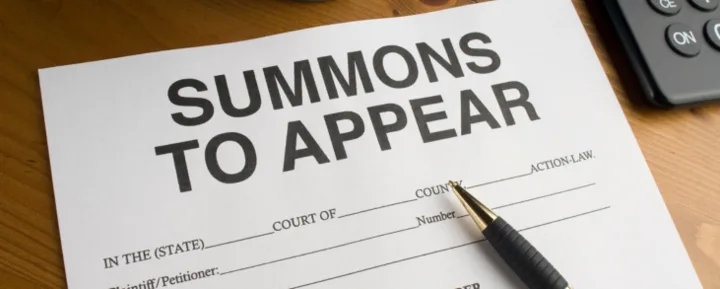Being in debt can be an emotional burden in addition to a financial one. Unfortunately, if you’re unable to pay back your debt, your lender can sue you to force you to pay what you owe. If you’ve been sued by a lender or debt collector, don’t lose hope yet — there are steps you can take to protect yourself and minimize the financial impact, and you may even be able to have the lawsuit thrown out altogether, with the help of an experienced debt relief attorney.
Understanding a Debt Collection Summons
A summons is a legal document you’ll receive when you’re being sued. Along with a complaint, it informs you that someone is suing you, describes their claims against you, and requires you to respond by filing an answer.
If you’re sued for your unpaid debt, the complaint and summons will include the name of the lender or debt collector, as well as the amount and type of debt that you owe. You could receive a summons for unpaid credit card debt, loans, medical bills, rent payments, utility bills, or other outstanding debts.
A summons will also include instructions for how and when to respond. Depending on the state in which you live, you will usually have between 20 and 30 days to respond. Failure to respond could result in a default judgment against you.
Steps to Prepare Your Response
If you’re sued by a lender or debt collector and receive a court summons, it’s essential that you address it immediately. Putting it off will only cause more problems.
1. Review the Summons Thoroughly
First things first, make sure you fully understand the nature of the lawsuit. Read the summons thoroughly to know who is suing you, what debt you’re being sued for, and how much you owe.
A summons is a legal document, and it may be difficult to understand, especially if you don’t have any experience with the court system. If you have any questions or concerns about the summons, look for a debt relief attorney who can explain the lawsuit and your next steps. Though it can be done without an attorney, working with an expert debt relief attorney will give you more peace of mind.
2. Collect and Organize Relevant Documents
Before providing an answer to the summons, collect and organize any relevant documents you have. Relevant documents could include records and bank statements, such as your most recent credit card statement or loan payment confirmation. If you have any records of communications with your lender, including payment history details, whether it be emails, letters, or records of phone calls, collect those as well.
These documents may be useful down the road if the lawsuit goes to court and you have to defend the debt collection lawsuit. They can also help verify the debt and the information in the summons is legitimate. If your records show different information from what’s in the lawsuit, you may have a defense in court.
3. Note Important Deadlines
It’s essential that you pay close attention to any deadlines included in the summons. The document will typically include a date by which you must answer the summons.
This date isn’t a suggestion — failing to respond to this debt could have significant consequences. If you don’t answer the summons, a court will likely automatically side with the plaintiff (in this case, the lender or debt collector). If that happens, you could have a default judgment issued against you and have your wages garnished to repay the debt.
Exploring Legal Options and Defenses
When you’re sued for your unpaid debt, you’ll have the opportunity to raise a defense, which can help either minimize the amount you owe or get the lawsuit thrown out altogether. Here are some common defenses you can raise for a debt collection lawsuit:
- Payment, Settlement, or Discharge: If you’ve already paid or settled the debt, or the debt was discharged during bankruptcy, then you can have the lawsuit dismissed.
- Not Your Debt: There won’t be a judgment issued against you if the debt isn’t yours (for example, the lender got you mixed up with someone else) or the debt was the result of identity theft or fraud.
- Statute of Limitations: Most states require that lenders sue within a certain amount of time for an unpaid debt. If this statute of limitations has passed, the lender doesn’t have legal standing to sue.
- FDCPA Violation: If the lender violated the Fair Debt Collection Practices Act, you may be able to use that as a defense in court and/or file a counterclaim against the lender.
When you’re sued by a debt collector, it’s important to validate the debt before paying it or raising any other defenses. Under the FDCPA, a lender must validate a debt in writing. If your lender can’t prove you owe the debt, they won’t be able to prove you owe the money.
How to Write and File Your Response
When you’re ready, you’ll write and file your response (also known as an answer) to the lender’s summons. In most cases, you’ll either admit or deny the debt collector’s claims. In some states, there’s a specific answer form you can download from your state’s court system website or your county’s clerk of courts. You can also have an attorney draft your response or use an online tool to generate one.
In your answer, you’ll need to either admit or deny each allegation in the summons and complaint. It’s important to respond to each allegation separately — failure to respond timely to just one could result in a default judgment against you. In your answer, you can also indicate if you’re raising any affirmative defenses or raising a counterclaim.
Once you’ve completed your answer, you should submit it to the court clerk before the due date indicated in the summons and you may have to serve the other side so always check court rules. You may be able to do this either online, in person, or through the mail. You’ll also have to provide a copy of your answer to the plaintiff (the creditor) or their attorney so be sure you have proof of this. Visit your state’s court website for specific instructions on how to file and serve your answer.
Depending on where you live and your answer, there may be a filing fee when you submit your answer. You probably won’t have to pay fees if you’re just submitting an answer admitting or denying the allegations. But if you’re raising a counterclaim, you might have filing fees.
Throughout this legal process, a small mistake could result in the court siding with the creditor. Avoid these common mistakes when filing your answer:
- Not responding to the lawsuit at all
- Not providing your answer by the due date listed in the summons
- Admitting to all allegations without consulting an attorney
- Failing to include your affirmative defense, if you have one
- Failing to respond to each individual allegation in the complaint
- Improperly filing your answer with the court
- Not sending a copy of the answer to the plaintiff
What Happens After You Respond?
Once you’ve filed your answer, look for communications from the court with updates about your case or any upcoming court dates. Before appearing in court, you may go through a discovery phase, where the plaintiff will request information from you about the debt. In response, you or your attorney may also request information.
As you prepare for court, gather any information you think may be helpful in your defense. Then, once you’ve been given a court date, you can attend the hearing and present your case to the judge.
At court, one of a few different things could happen. First, if you’ve raised an affirmative defense to the debt they claim you owe, the judge may dismiss the case. For example, this could happen if the statute of limitations has passed or you’ve already paid the debt.
Next, the court could rule in the creditor’s favor and issue a judgment against you. The judgment will likely order you to pay the unpaid debt, as well as possibly legal fees, interest, late fees, etc. If this happens, the court could also issue a collection order. Some ways the court may collect the debt include wage garnishment, bank account levies, or property liens.
Finally, there’s an opportunity for you and the creditor to negotiate a debt settlement before a judgment is issued. When you settle a debt, you typically agree to pay less than the original debt balance. In return, the lender is guaranteed to recover some of its losses, either in the form of a lump-sum payment or an installment plan. A settlement may be in your best interests if you have no affirmative defense and are likely to lose the lawsuit.
Seeking Professional Legal Assistance
Navigating the legal process is no easy task, especially when you’re being sued. You should consider hiring an attorney if you receive a debt collection summons and aren’t able to (or don’t want to) pay the debt. An experienced debt help attorney can help you draft and file your answer, raise an affirmative defense, state your case in court, or negotiate a debt settlement to make sure this is all done right and you don’t end up with more problems.
As you search for legal representation, make sure to choose a reputable debt lawyer or law firm with a strong history in debt relief on the type of matters you have. Someone with a proven track record in resolving debt collection has a better chance of getting you a favorable outcome, either in or out of court since it is not an easy process you wouldn’t want someone to be learning off of your case.
If cost is an issue, consider exploring your state or county’s legal aid organizations, pro bono legal services, and other affordable options. For example, some law schools have limited free legal services. Even if they can’t represent you in court, they may be able to give you free legal advice, help you draft your summons answer, and review any other documents for your case.
Conclusion
If you receive a summons and complaint for consumer or business debt collection, it’s critical that you respond properly and in a timely manner. While it often feels easier to ignore the problem, ignoring a debt collection lawsuit will do far more harm than good. You’ll want to get to work right away exploring your defense options, filing your answer, and preparing to either negotiate a settlement or appear in court.
If you’re facing a debt lawsuit, you don’t have to go it alone. The experienced attorneys at Tayne Law Group have more than two decades of experience helping borrowers like you navigate debt related lawsuits and deal with creditors from credit cards, MCA, business debt, student loans and other debt matters. If you need help dealing with your debt, call us at (866) 890-7337 or fill out our short contact form for a free phone consultation. We never share or sell your information, and all conversations are confidential.


